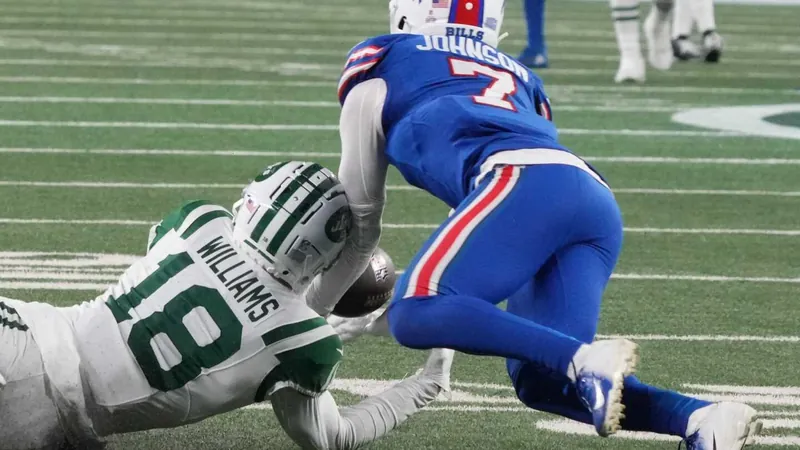
Aaron Rodgers Blames Mike Williams for Costly Interception: What Really Happened?
2024-10-15
Author: Yan
Summary of the Game Incident
In a high-stakes game that ended in disappointment for the New York Jets, quarterback Aaron Rodgers made headlines by pointing fingers at wide receiver Mike Williams for a crucial interception during their loss to the Buffalo Bills on Monday night. While it’s a common narrative that interceptions are primarily the quarterback's fault, this latest incident raises eyebrows about the dynamics between the two players on the field.
Rodgers' Reactions
After the game, Rodgers appeared somewhat defensive when questioned about the pivotal play, responding tersely, 'What about it?' But as the inquiries continued, he revisited the sequence, explaining, 'It was two verticals. Allen [Lazard] is down the seam, and Mike is down the red line. I’m looking at Allen; he puts his hand up, and three guys go with him. So I’m throwing a no-look to the red line. But when I peek back, Mike is running an in-breaker. It should have been down the red line.'
Communication Breakdown
Rodgers’s comments indicate a clear breakdown in communication between him and Williams. When asked if he anticipated Williams returning to the ball, Rodgers clarified, 'No, I was throwing to the red line. But I realized he was running an in-breaker and had to adjust.' This adjustment, however, came too late; the ball found its way into the arms of a Bills defender.
Expert Analysis
Former NFL player Devin McCourty, who covered the game for Westwood One, added more insight during a discussion on PFT Live, suggesting that Rodgers should not have thrown the ball where he did. Notably, running back Breece Hall was open in the flat during that play, hinting at a missed opportunity. Moreover, McCourty explained that the 'red line,' an area four to five yards from the sideline, is typically marked on practice fields to guide receivers on their routes.
Player Instincts vs. Decision Making
In this pressing moment, Williams took it upon himself to adjust his route, exhibiting a player’s instinct to make a play. However, Rodgers, rather than throwing the ball away or recognizing the open Hall, opted to tweak the pass mid-delivery—a decision that culminated in the critical turnover that sealed the game.
Future Implications
This incident highlights a recurring theme in high-pressure situations: the interplay of communication and decision-making on the field can drastically alter the outcome of a game. As the Jets regroup and prepare for their upcoming match, all eyes will be on Rodgers and Williams to see how they address this disconnect and work on their chemistry moving forward. Will they bounce back and turn this miscommunication into a learning experience, or will it haunt them as they chase their playoff aspirations?


 Brasil (PT)
Brasil (PT)
 Canada (EN)
Canada (EN)
 Chile (ES)
Chile (ES)
 España (ES)
España (ES)
 France (FR)
France (FR)
 Hong Kong (EN)
Hong Kong (EN)
 Italia (IT)
Italia (IT)
 日本 (JA)
日本 (JA)
 Magyarország (HU)
Magyarország (HU)
 Norge (NO)
Norge (NO)
 Polska (PL)
Polska (PL)
 Schweiz (DE)
Schweiz (DE)
 Singapore (EN)
Singapore (EN)
 Sverige (SV)
Sverige (SV)
 Suomi (FI)
Suomi (FI)
 Türkiye (TR)
Türkiye (TR)